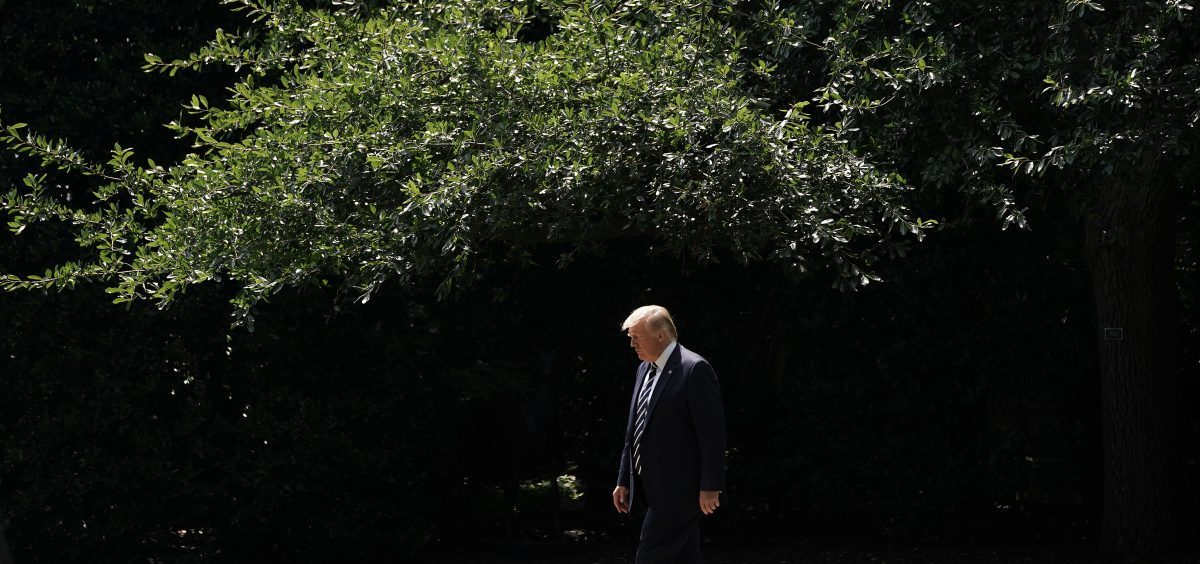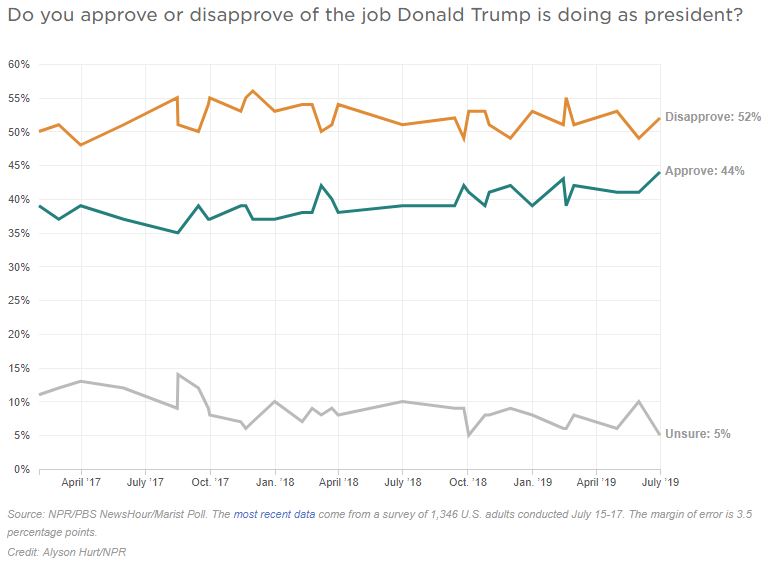News

Poll: Americans Not Sold On Trump — Or Democrats
By: Domenico Montanaro | NPR
Posted on:
Updated at 12:20 p.m. ET
Democratic presidential candidates are proposing lots of progressive policies in this election. And while those policies may resonate with the party base, some of those ideas are not popular with a general election electorate, according to a new NPR/PBS NewsHour/Marist poll.
And overall, independent voters said they were not impressed with the direction either President Trump or Democrats want to take the country at this point ahead of the 2020 election, the findings show.
“Independents are on the fence overall,” said Lee Miringoff, director of the Marist Institute for Public Opinion at Marist College, which conducted the poll. “They’re not willing to grant President Trump reelection, and yet they’re not persuaded by Democrats at this point.”
Trump did his best in this polling since taking office, but his approval rating is still just 44%. Fewer independents are undecided about the president and give him a 42% approval rating, up from 35% in June.
The poll was conducted from July 15 to 17, after the president’s July 14 tweet that four Democratic congresswomen of color, all American citizens, should “go back” to their countries of origin. The poll of 1,336 adults has a margin of error of plus or minus 3.5 percentage points.
Don’t see the graphic above? Click here.
What’s more, by a 53%-to-39% margin, Americans said they would definitely vote against Trump, statistically unchanged from a month ago; 54% of American voters did not vote for Trump in 2016.
Among independents, a third said they would definitely vote for the president, up from one quarter. A majority — 54% — say they definitely won’t, about the same as last month.
The economy
There’s a tremendous gap between views of the president overall and how Americans feel about the economy. Even though Trump gets just a 44% approval rating overall, 52% of registered voters approve of his handling of the economy and two-thirds — 65% — of Americans think the economy is working well for them, including 62% of independents.
“Independents are pleased with the economy, but it is not converting to a strong endorsement on his [Trump’s] reelect question,” Miringoff said.
So there’s a political opportunity for Democrats.
But what Americans have heard about the primary so far is not necessarily giving them confidence that Democrats offer a better way. Americans split 46%-to-43% on whether Democrats would take the country in the wrong direction or right one.
And with all-important independents, more (48%) think Democrats would take the country in the wrong direction than the right one (40%).
Democratic loyalists vs. independent voters
There are areas in which Democrats’ policy proposals are on solid footing with the overall electorate:
— Requiring background checks for gun purchases or private sales (89% say it’s good idea)
— Medicare for all who want it, presenting it as an option (70%) rather than doing away completely with private health insurance (41%)
— Regulating prescription drug prices (67%)
— Providing a pathway to citizenship for immigrants in the U.S. illegally (64%)
— Investing in so-called green jobs and energy efficient infrastructure (63%)
— Increasing taxes on those making more than $1 million (62%)
— Legalizing marijuana (63%)
— Banning assault-style weapons (57%)
— Raising the federal minimum wage to $15 an hour (56%)
Areas that are less popular include:
— A guaranteed universal basic income of $1,000 per month for American adults (26%)
— Providing reparations for slavery (27%)
— Decriminalizing illegal border crossings (27%)
— A national health insurance program that is available to immigrants in the country illegally (33%)
— Abolishing the death penalty (36%)
— Medicare for all replacing private health insurance (41%)
— Getting rid of the Electoral College (42%)
“These would be issues where people would say the Democratic Party is too far to the left,” Miringoff said, “and that’s warranted within the data.”
On “Medicare for All,” “whether it is a choice or a replacement is a huge distinction in terms of how the public reacts,” Miringoff added.
On rejoining the Paris climate agreement, 53% think it’s a good idea and just 31% think it’s a bad idea, but that leaves many undecided.
People are split or give less support to: giving free college tuition at public colleges and universities (53% said good idea, 43% said bad idea); a tax on carbon-based fuels such as coal, oil and natural gas (50% vs. 44%).
Repealing Obamacare unpopular
One area that jumps out as a warning for Republicans is repealing the Affordable Care Act.
Just 44% think it’s a good idea, while 51% think it’s a bad one. The degree to which the tide has turned on that issue is remarkable considering how much the fight over so-called Obamacare helped Republicans in 2010 while President Barack Obama was in office.
Republicans voted to repeal the law dozens of times while Obama was in office, but with full control in Washington during Trump’s first two years, they were not able to repeal or replace the health care law in full.
The divided states of America
One major takeaway from the poll is that America is a nation divided. Democrats and Republicans are worlds apart on the things they think are good ideas. Some of the widest splits on what the parties thought were good ideas were:
— Rejoining the Paris climate agreement (63 points)
— Investing in green jobs (60 points)
— Repealing Obamacare (60 points)
— $15 minimum wage (58 points)
— Free college at public colleges and universities (57 points)
— Increasing taxes on those making more than $1 million (56 points)
— Health care for immigrants in country illegally (54 points)
— Semi-automatic weapons ban (54 points)
Click here for the full graphic.
Of the 20 policy proposals respondents were asked about, many of which have been floated by Democratic presidential candidates, a majority of Democrats were in favor of 16 of them.
A majority of independents thought 12 were good ideas, while a majority of Republicans, as to be expected, were in favor of just three — repealing Obamacare, stricter gun background checks and regulating prescription drug prices.
2020 Democratic primary
There are lots of reasons to discount who has the early lead in primary polls, and that is borne out again in this survey — 82% of Democrats or Democratic-leaning independents say they have not yet made up their mind in the Democratic primary.
That is pretty much unchanged from a month ago, when 84% said their minds were not yet made up. A majority (54%) though say they want a nominee who can beat Trump rather than one who shares their position on most issues (42%).
That’s a 13-point swing from last month when 47% said they wanted someone who shared their position on most issues versus 46% who said they wanted someone who has the best chance of beating Trump.
The poll of 1,346 adults was conducted from July 15 to 17. The respondents were reached by telephone, both cellphone and landline, with live callers. It has a margin of error of +/- 3.5 percentage points. The survey reached 1,175 registered voters and has a margin of error for that group of +/- 3.7 percentage points. There were 553 Democrats and Democratic-leaning independents interviewed. Results referring to Democrats’ views therefore have a margin of error of +/- 5.4 percentage points.
9(MDI4ODU1ODA1MDE0ODA3MTMyMDY2MTJiNQ000))


